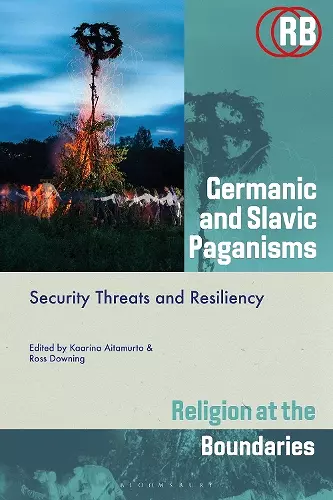Germanic and Slavic Paganisms
Security Threats and Resiliency
Kaarina Aitamurto editor Ross Downing editor
Format:Hardback
Publisher:Bloomsbury Publishing PLC
Published:12th Dec '24
£76.50 was £85.00
Supplier delay - available to order, but may take longer than usual.

Examines contemporary Slavic and Germanic Paganisms, and their potential for both far-right, ethno-purist and nationalistic social movements as well as inspiring social and ecological renewal.
Providing an intensive and up-to-date analysis of far-right, ethno-purist and nationalistic currents as well as the inclusive visions for social and ecological change, this book explores the complexities of contemporary Slavic and Germanic Paganisms.
This timely volume re-evaluates what we know about contemporary Paganism, particularly addressing the social threat and impact of radicalism. In light of the war in Ukraine, the authors deconstruct heritage narratives that are at the heart of current geopolitical and nationalist social tensions in Central and Eastern Europe including the West versus East problem. With suggestions on how we can mitigate and overcome the potential security threats connected to radical forms of Paganisms, this book shows how minority groups are advancing solutions to global challenges.
Exploring multiple perspectives through a diverse blend of contributors, this volume bridges the gap between academia, governmental institutions and Pagan communities, providing a rich resource for all parties. Highlighting broader religious and security issues, this volume is the first to consider the dialogue between ethno-exclusivist and inclusivist positioning within contemporary Slavic and Germanic Paganisms.
The volume testifies to the growing importance of studying ethnic nationalist currents in modern Paganism, and helps open up new questions for scholars to pursue in this area. * Nova Religio *
This book is a serious, scholarly and ground-breaking examination of a growing danger facing many countries around the world, the fusion of violent, racist, far-right political groups with “Pagan” religious movements based on European religion, mythology and ethnic identity. This is the most in-depth, extensive and up-to-date study of this topic and is recommended for scholars and students in Religious Studies, in Sociology and Security Studies, and for libraries serving the general public. * Michael Strmiska, SUNY Orange, USA *
A crucial extension to our body of knowledge on the political uses and abuses of Heathenry and Paganism, this book is an authoritative, well-researched and timely account, tackling issues surrounding socio-political instrumentalisation of religion for extremist and non-extremist purposes. Utilising a variety of different Eurasian and American case studies, Kaarina Aitamurto and Ross Downing are the first to consider the dialogue between ethno-exclusivist and inclusivist positioning within contemporary Slavic and Germanic Paganisms. * William Allchorn, Anglia Ruskin University, UK *
A much-needed, nuanced and wide-ranging analysis, by both academics and practitioners, of the varieties of contemporary Germanic and Slavic-inspired Paganisms. One of its greatest strengths lies in not only examining the ways by which a transnational far right has endeavoured to appropriate the Faith, but also how the faithful can fight back against this usurpation. * Dominic Alessio, Richmond American University London, UK *
For the field of religious studies, the book stands out for its combination of analytical rigor and sensitivity to internal religious reasoning, narrative, and symbolism. Its inclusion of insider perspectives makes it a model for ethically grounded, interdisciplinary research on contested religious identities in contemporary Europe. * Religious Studies Review *
The new Pagan religions of Central and Eastern Europe exert a cultural influence that goes beyond their relatively small numbers, from attracting the attention of political journalists to being cited by Russian propagandists as “satanists” who would be eliminated in their invasion in Ukraine. Their claims of “native faith” challenge contemporary discourses on indigeneity and nationhood as well as dominant monotheisms. Ross Downing and Kaarina Aitamurto, both experienced scholars in this field, have produced a splendid resource for anyone inquiring about these movements. * Chas S. Clifton, Pomegranate: The International Journal of Pagan Studies, UK *
As an inclusive Pagan, there are a lot of books out there that seek to look at different forms of Paganism. Bringing together a fascinating collection of contributors, all deliver. Not scared to talk about difficult subjects, this book digs deep into what is happening but also looks for solutions to how Paganism can flourish, without the stigma of ERW (Extreme Right-Wing) associations. With links to lots of research points, this book doesn’t close a door, it opens several and it is my sincere hope that from this book, it will widen discussions and allow those looking for answers, to those who seek to warp paganism for their own ends, to build on this book and create answers that will allow Paganism to grow to its full potential and offer those searching for a lifestyle based on nature and the Gods, a home for all who want it. * Nigel Bromage, Exit Hate Trust, UK *
This book is a collection of insightfully informative essays concerning Germanic and Slavic paganisms as they reflect in particular contemporary social identities and their visions of the past in terms of who possesses belonging rights and which lands or places are to be claimed through them. These captivating essays introduce lay-readers as well as academics to an under-investigated “water-margin for societies’ relationships with the past” that has largely remained outside the mainstream. The work as a whole is a highly recommended contribution to understanding the dynamics of contemporary paganisms and their interactions with social, political and military movements. * Michael York, Pagan Theology: Paganism as a World Religion, UK *
Germanic and Slavic Paganism in its ultra-nationalist, extreme form has become a fundamental dimension of both Russian and Ukrainian wartime mentality, but also in Western and Central European countries. This recent development has been disturbingly ignored by academic scholars, however, this book sheds a bright light on these shifting foundations of Paganism. Offering potential strategies and policies for solutions, this volume analyses the complex and nuanced, sometimes contradictory, and often surprising worldviews of pagan extremists. * Birgit Menzel, University of Mainz, Germany *
ISBN: 9781350423916
Dimensions: 236mm x 160mm x 24mm
Weight: 640g
328 pages